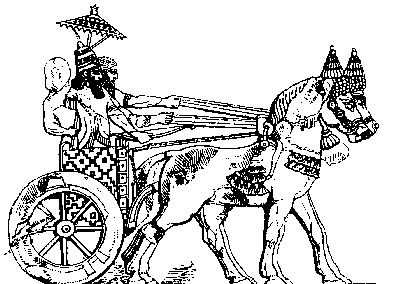CHAPTER NINE
THE DEPORTATION OF THE HOUSE OF ISRAEL
Hosea 9 reminds us of Israel’s terrible fate but marvellous destiny
Israel invaded by Assyria

Sargon II, king of Assyria, in his chariot
“Rejoice not, O Israel, for joy, as other people: for thou hast gone a whoring from thy God” (v1). “Surely as a wife treacherously departeth from her husband, so have ye dealt treacherously with Me, O house of Israel, saith the LORD” (Jeremiah 3:20). ISRAEL was married to the Lord (Jeremiah 3:14); now she would be divorced (but not JUDAH), and sent away (Jeremiah 3:8), deported to Assyria under Tiglath-pileser III (2 Kings 15:29, 1 Chronicles 5:26), Shalmaneser V (2 Kings 17:3) and Sargon II (Isaiah 20:1). There they would be reduced to the utmost poverty.Jesus’ parables of the Kingdom
“And they shall eat unclean things in Assyria” (v3). “And he would fain have filled his belly with the husks that the swine did eat” (Luke 15:16). Note: the prodigal son is ISRAEL; his elder brother, JUDAH (Luke 15:11). How many of Jesus’ parables express the truth of His rejection of the JEWS (remnant of Judah) and conversion of the House of ISRAEL?The two sons (Matthew 21:28–32). The first said he would go to work but didn’t (Jews), the second said he wouldn’t go but did (Israel). The vineyard (Matthew 21:33–44), taken away from the husbandmen in possession (Jews) who kill the owner (Jesus), and given to other husbandmen (Israel) who render Him the fruits. The ten virgins (Matthew 25:1–13). All (Judah and Israel) had lamps: the five wise (Israel) went in to the marriage, the five foolish (Jews) were shut out because their oil had run out. The rich man and Lazarus (Luke 16:19–31). Both died: the beggar (Israel) was received into Abraham’s bosom, the rich man (Jews) was tormented.
Note: The Bible frequently calls ISRAEL the vine (10:1) and JUDAH the fig tree (e.g. Psalm 80:8, Jeremiah 24); the Jews knew this symbolism. “When [Jesus] saw a fig tree in the way, He came to it, and found nothing thereon, but leaves only, and said unto it, Let no fruit grow on thee henceforward for ever. And presently the fig tree withered away” (Matthew 21:19). Jesus explained his action by telling the parable of the vineyard (Matthew 21:33–44). The fig tree—the Jewish nation—bore leaves but no fruit; it would die. Jesus said, “The Kingdom of God shall be taken from you [Jews], and given to a nation [Israel] bringing forth the fruits thereof” (Matthew 21:43).
Luke’s version is even stronger: A certain man [Jesus] had a fig tree [Jews] planted in his vineyard [all Israel]; the fig tree was barren. He had come three years seeking fruit and found none. It would be left for a fourth year for His special attention; if it still did not bear fruit it would be cut down. After three and a half years of Jesus’ ministry the Jews rejected Him, bringing about the cutting down of their fig tree (Luke 13:6–10). Jesus wept over Jerusalem (Luke 19:41); the Jewish nation was destroyed in AD 70.
“My God will cast them away, because they did not hearken unto Him: and they shall be wanderers among the nations” (v17). The errant wife—ISRAEL—is divorced, cast off, sent away. But Jesus dies for her, redeems her, wins her back, nullifies the divorce (Isaiah 50:1). He makes a New Covenant with her (Jeremiah 31:31–33, Hebrews 10:16), remarries her (2:19); she becomes a Christian people. But the JEWS reject the New Covenant.
Judah deported to Babylon
“In that day, saith the LORD, will I assemble her that halteth [Judah], and I will gather her that is driven out and ... afflicted; and I will make her that halted a remnant, and her that was cast far off [Israel] a strong nation” (Micah 4:6–7). JUDAH halted, i.e. did not wholly apostatize, so was deported to Babylon in 604 BC, and a remnant—from then on known as JEWS—allowed to return in 534 BC. ISRAEL, wholly apostate, would be deported to Assyria, 735–670 BC, but become a strong nation [ éÈà goi = gentile], embracing the faith of the Lord Jesus Christ and becoming the nucleus of the Church and Kingdom of God on earth (1 Peter 2:9–10).“But thou, Bethlehem Ephratah, though thou be little among the thousands of Judah, yet out of thee shall He [Messiah] come forth unto Me that is to be ruler in Israel; whose goings forth have been from of old, from everlasting. Therefore will He give them up [Jews], until the time that she which travaileth [Israel] hath brought forth: then the remnant of His brethren [Jews] shall return unto the children of Israel” (Micah 5:2–3). Israel is under the New Covenant—Christians!
Next chapter | back to Contents | back to Introduction and Map